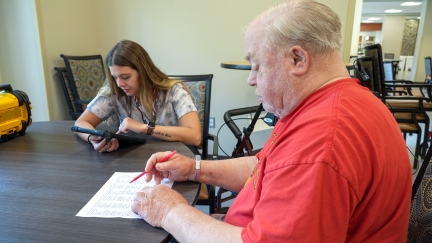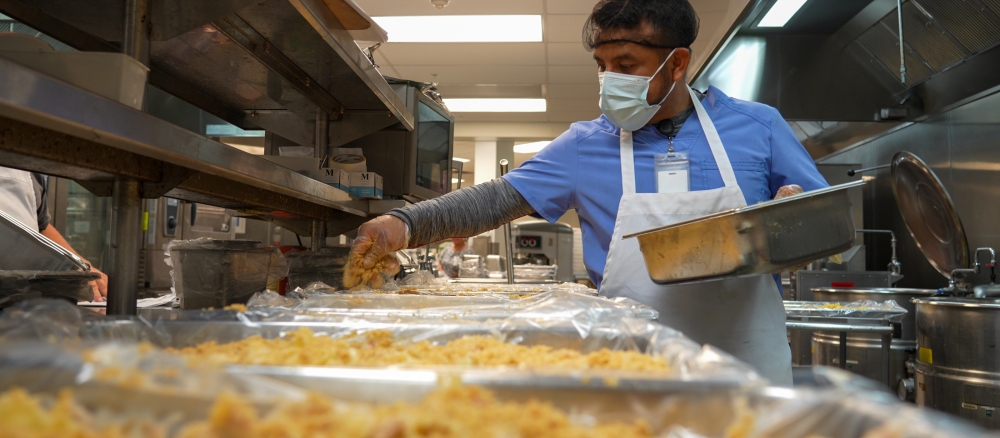For Sheldon Weiss, a resident at the Minnesota Veterans Home in Minneapolis, growing up during the Great Depression taught him the value of conserving food.
“Some spaghetti, a couple of meatballs, and a nice marinara sauce — what more could you ask for!” he says.
Not everybody at the home joins Weiss in the clean plate club, however, which posed a challenge for the Minnesota Department of Veterans Affairs (MDVA): How to prevent food waste and at the same time provide ample and nutritious meals for its residents. To solve that challenge, the MDVA recently teamed up with the MPCA to implement new technology that will reduce the amount of food that is thrown away in its homes.
Using a $185,000 grant from the MPCA's Resource Management and Assistance Division, the MDVA revamped the way it serves food to residents. The MDVA started by investing in new iPads and software for its facilities in Minneapolis, Hastings, Silver Bay, Fergus Falls, and Luverne. MDVA staff used this technology to implement a new ordering system that allows residents to order their meals in real time, rather than having to place their orders weeks in advance.
“Before, you ate what you got, and if you didn’t like it, you just didn't eat it,” said Richard Evans, a resident at the Minneapolis Veterans Home. “I was raised in a family where we didn’t have a lot of excess food. Now I feel more comfortable saying, ‘don’t give that to me’ if I’m not going to eat it.”

Real-time ordering cuts down on common reasons food gets wasted. For example, when residents order their food for the week on Monday, sometimes they change their mind about what they want for dinner by Friday, and that food goes to waste. Real-time ordering also reduces items that might become ineligible for residents based on restrictions placed on their diet mid-week. The software also eliminates extra ordering for anticipated guests that do not show up during the week.
By keeping excess food out of the trash, the MDVA is helping to alleviate the growing problem of food waste in Minnesota and across the country. According to a study commissioned by the MPCA, most of the food Minnesotans throw out — about 62% — could have been eaten or donated. Instead, when food spoils or is thrown away before we eat it, the resources that went into creating the food — including the water used to grow the food and the diesel used to transport it — are wasted, requiring additional resources to nourish people and help alleviate food insecurity. If it’s not composted properly, that tossed food then takes up space in landfills and releases greenhouse gases such as methane as it decomposes.
With this new technology, the MDVA expects to prevent 14,000 pounds of wasted food per year. That translates into $30,000 worth of savings or more than 26 tons of prevented greenhouse gases.
The MPCA will offer another round of food waste prevention and food rescue grants later this year. In the meantime, visit the MPCA’s waste initiatives page for tips on making the best use of the food you already have.
